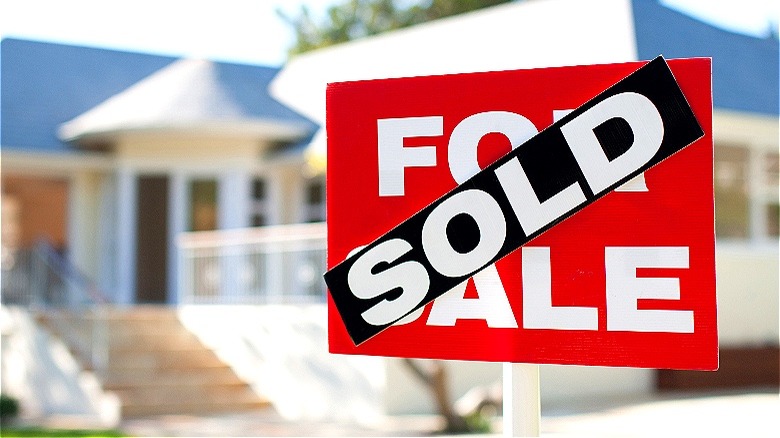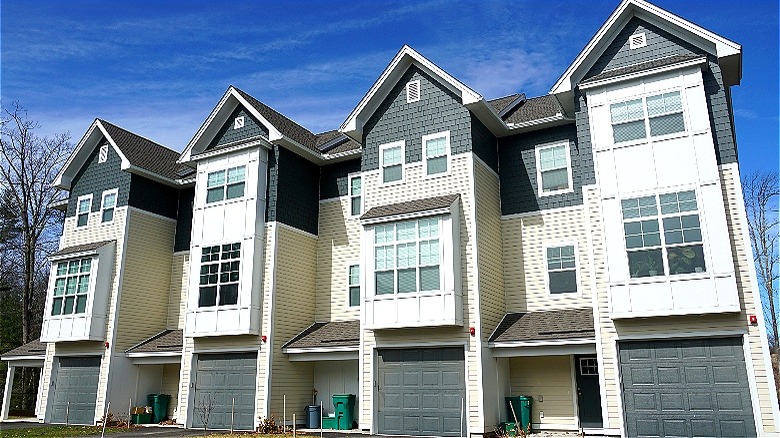Places In The US Where It's Actually Cheaper To Rent Than Buy
For decades, the idea of throwing money away on rent has haunted homeowners (along with other myths about buying a home). Why pay monthly for the privilege of dealing with noisy neighbors, poorly maintained properties, and greedy landlords when you could invest in a decent down payment and a manageable mortgage? Homeownership wasn't always just the American dream; it also made good financial sense. But a recent study has found what many renters and struggling homeowners alike may have suspected in recent years: It's actually cheaper to rent than buy in many places.
Bankrate's 2024 Rent vs. Buy study analyzed median monthly rents and mortgages in all 50 states. Nationally, typical rents come in at 36.6% cheaper than typical median monthly mortgages, per the study. In 21 of the 50 metro areas the outlet analyzed, monthly homeownership costs were at least 50% higher than the cost of renting. For some areas, the gaps between monthly rentals and the cost of owning a home were even greater, with top discrepancies in San Francisco/Oakland/Berkeley at 180.7%; San Jose/Sunnyvale/Santa Clara at 162.3%, and Seattle/Tacoma/Bellevue at 123%.
The pandemic effect on the housing market
The COVID-19 pandemic changed life as we know it, including the U.S. housing market. Remote working and sheltering-in-place changed how much space people wanted to live in, as well as where they wanted it. With traditional office buildings and schools facing indefinite closures, those in the position to do so, moved away from cities for better-priced, more spacious options. Cities previously known for high congestion and costs of living, such as New York City and San Francisco, saw their populations suddenly decrease as renters and prospective homebuyers sought greener pastures in other states.
Uncertainty and unemployment were high in the early days of the pandemic, and the stock market reflected anxieties about the future. In an attempt to staunch some metaphorical bleeding, the Federal Reserve slashed federal funds rates to keep borrowers borrowing, and mortgage lenders followed suit. Throughout the pandemic, rock-bottom interest rates on 30-year fixed-rate mortgages enticed homebuyers, who snapped up much of the available inventory.
Today, interest rates are up. Per Freddie Mac, the average mortgage rate for a 30-year fixed-rate mortgage, as of this writing, is 6.77%. Compare that rate to the 2.87% in August 2021. Homeowners looking to sell must contend with higher monthly mortgage repayment costs if they move, resulting in them either selling for record-high prices, or simply not selling at all. This results in what feels like a toxically tiny amount of options for average to affluent buyers and sellers, and a strange, frozen market that even economists struggle to understand.
The outlook for renters in the US
While the differential between most monthly rents versus mortgage payments hovers around $725, according to Bankrate's analysis, a closer look at nationwide data shows the apartment rental market has only recently shown signs of slowing rapid rent increases since the onset of the pandemic. Low-vacancy metrolands like New York still see sky-rocketing rental prices that defy supply and demand. However, cities like Austin and San Francisco saw declining rental prices in 2023. Nationally, new leases saw a cost increase of 20% from 2021 to 2022, but in 2024, data provider Yardi Matrix (via The Wall Street Journal) forecasts only a 1.5% increase for the next year.
There's one clear reason for the recent moderation of rental prices and their low predicted growth: You can't get blood from a stone. Per Yardi's data, the average American spends 32% of their annual income on rent, with pricier markets demanding even higher allocations. Meanwhile, Zillow's 2023 Rental Report highlights a typical monthly rent of $1,982, a figure 29.4% larger than pre-pandemic rates. Both apartment renters and single-family home renters alike get cold comfort in the form of concessions offered by potential landlords, including discounts on rent and waived pet fees.
While renting or owning a home can help you build wealth, the pandemic years have taken a toll on what that wealth does (or could) look like. Even if renting is cheaper than buying, the rent isn't cheap — though at least it might not get higher anytime soon. And on that note, try not to spend more than this much of your income on your rent.


